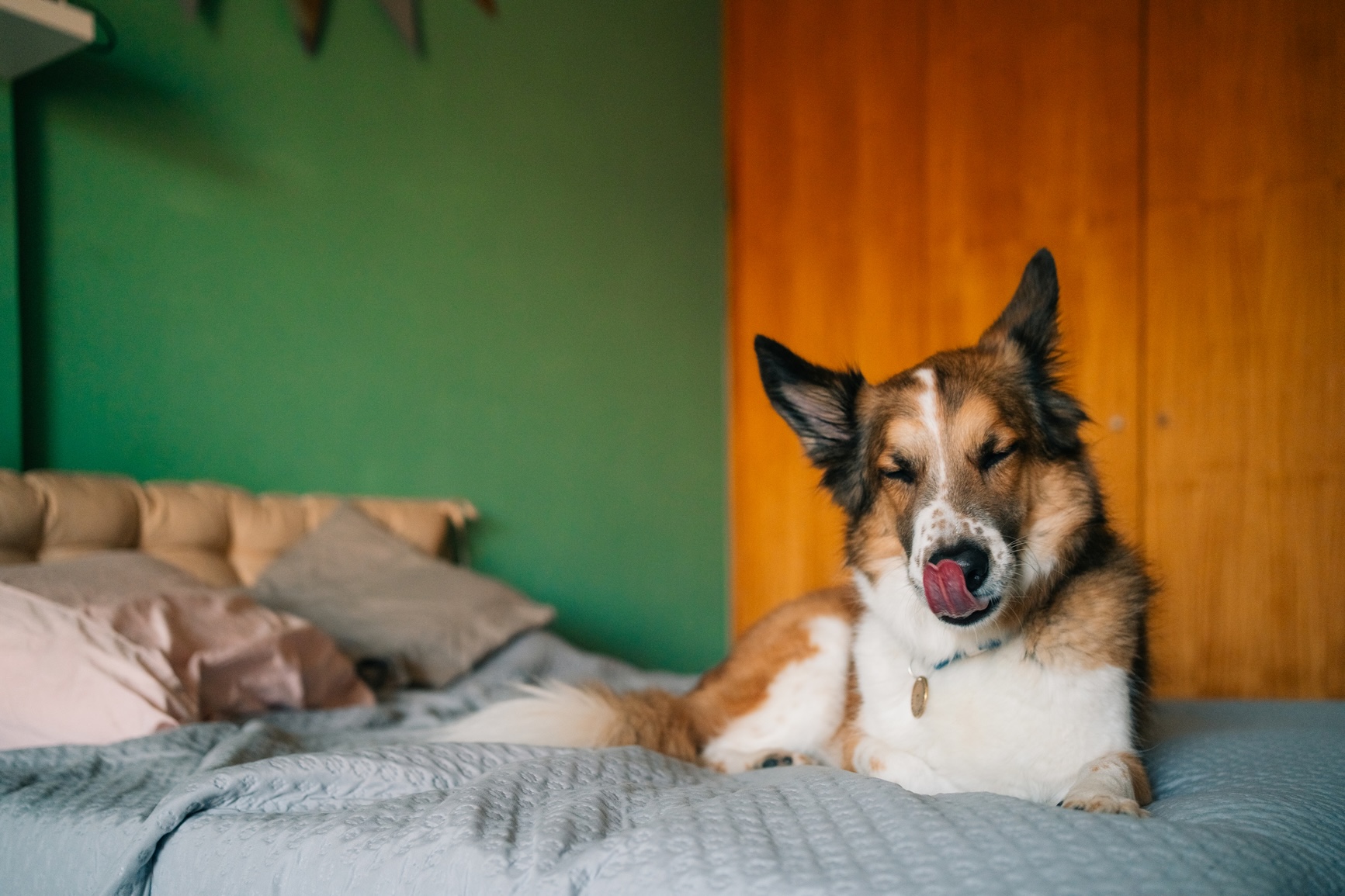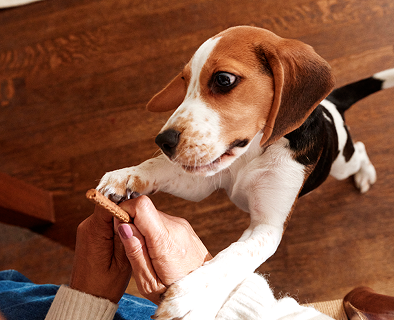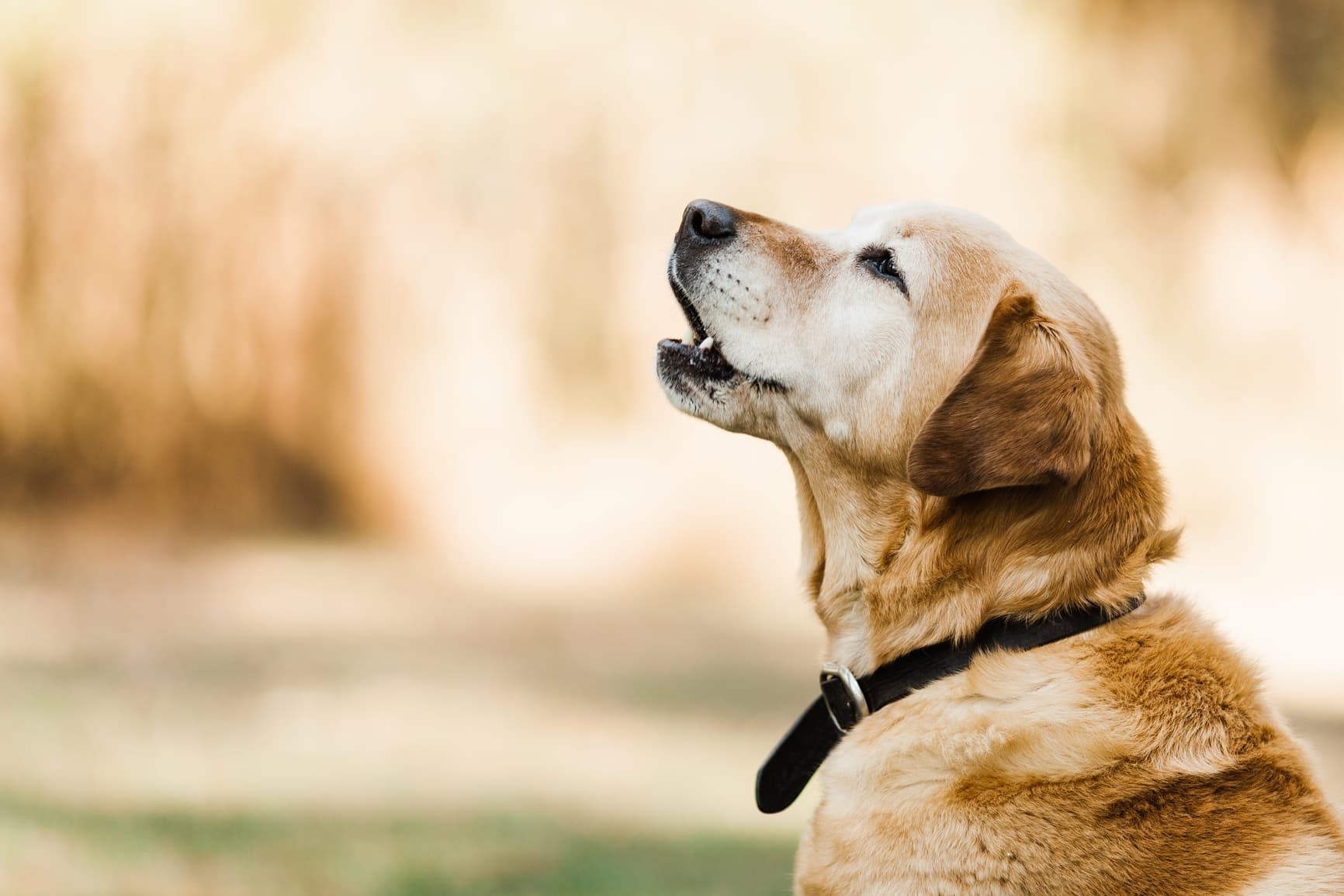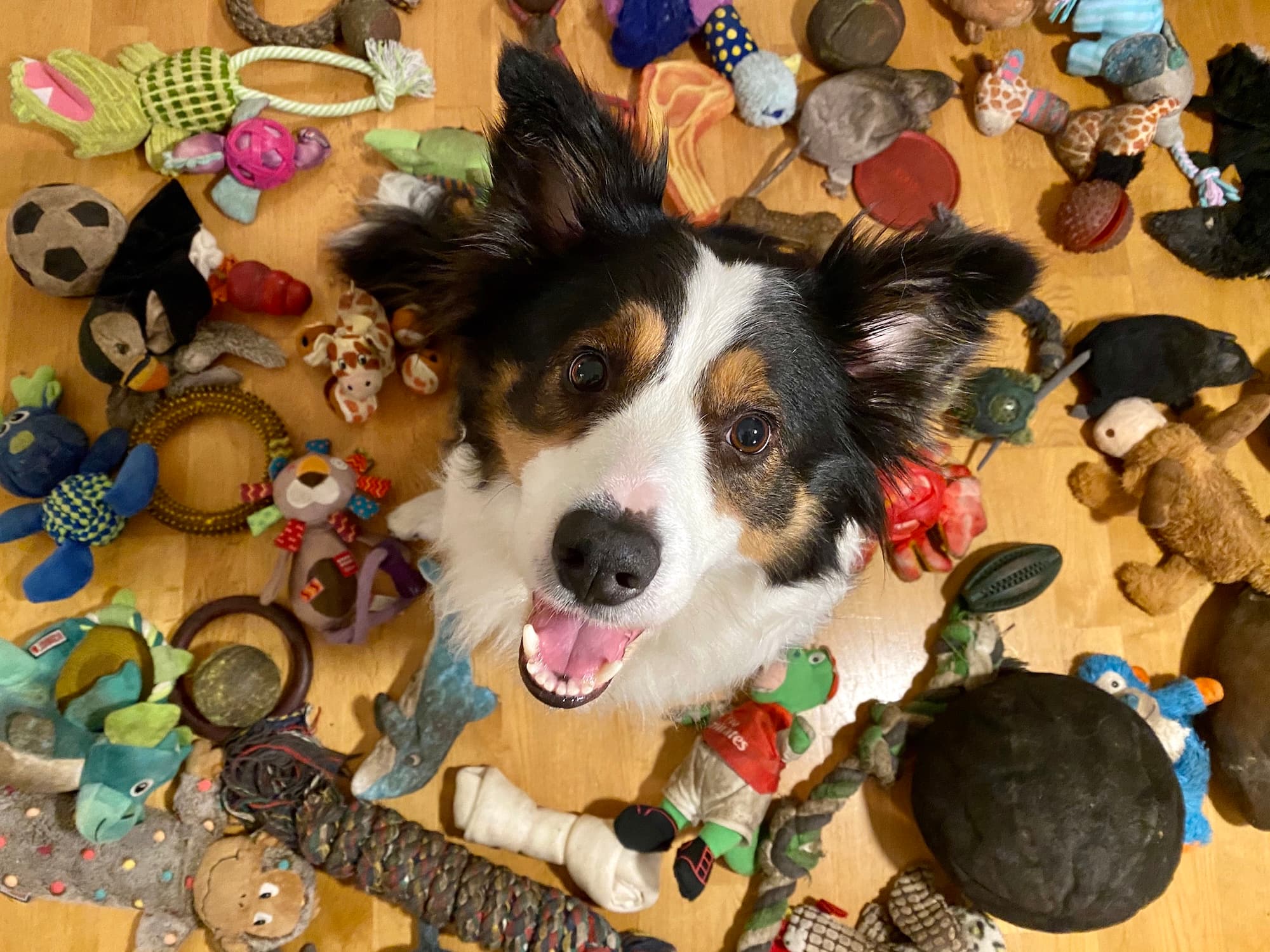
In this article:
- How did scientists study whether dogs can categorize objects by function?
- What do these scientists want to study next?
- Does this mean that dogs use language?
- Should this study change the way you treat your own dog?
- Is your dog a gifted word-learner?
Your dog likely has favorite toys—maybe one has a familiar smell, another looks like a lamb or a monkey, and a third has a texture they enjoy.
Sight, smell, and texture are what a scientist might call “perceptual” qualities—they have to do with a dog’s immediate sensory experience of an object. But can a dog also categorize toys based on their function?
Meaning: if two toys look, smell, and feel different, but are both used for fetch, can the dog learn that they have something in common?
Dr. Claudia Fugazza and her colleagues at Eötvös Loránd University in Hungary have published a study seeming to show that they can.
Sorting objects by what they’re for is an ability humans develop in early childhood. Previous research has found that some animals can do it, but only with extensive training. The Eötvös Loránd University researchers say that the dogs they studied were able to pick up the words for toys’ functions through natural play.
Dr. Stanley Coren, Professor Emeritus at the University of British Columbia and author of The Intelligence of Dogs, who was not involved in the study, told us that its findings are a very big deal.
“The rationale behind this study reflects back on the idea that some people still have, which is to suggest that dogs can only process information at the simplest levels,” Dr. Coren said. The results, he continued, “[confirm] the idea that dogs, at least the smarter ones, have minds which are the equivalent of a young human toddler.”
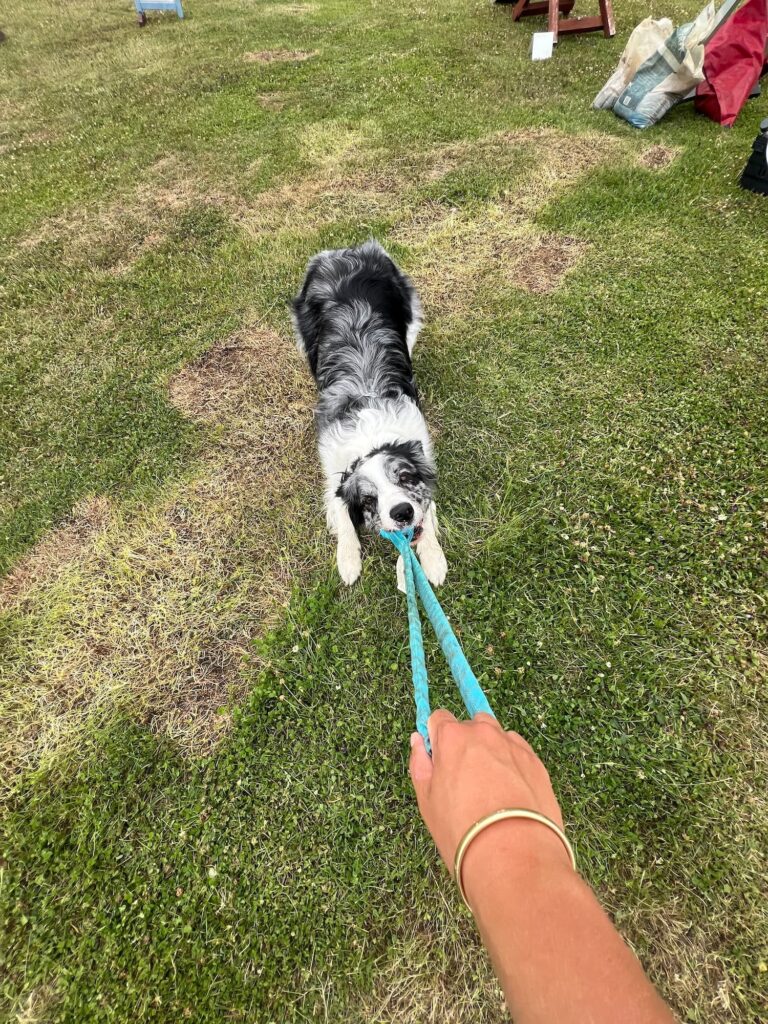
What happened in the study?
Dr. Fugazza and her colleagues sought out “gifted word-learner” dogs. These are dogs who, in the course of everyday life, have amassed large vocabularies. In general, dogs are smart—but gifted word-learners have a particular knack for understanding the words humans use.
“Most dogs,” Dr. Fugazza said, “do not learn verbal labels for objects. They learn verbal cues.” In other words, a typical dog will grasp the likes of “sit” and “stay”—but perhaps not “monkey” for an individual toy. Gifted word-learners can do the latter.
The seven dogs who completed this study learned words like “pull” and “fetch” for toys used to do those things. The owners would play with their dogs and use the words during the play (for example: “Look! This is a ‘pull!’ Good ‘pull!’” or “Look! How nice is this ‘fetch?’ Good ‘fetch!’”).
The owners then repeated the play with new toys that shared the “pull” and “fetch” functions, but looked nothing like the toys they’d previously played with in those categories. This time, they did not say “pull” or “fetch.”
The owners would then ask the dogs to “bring me a ‘pull’” or “bring me a ‘fetch.’” The researchers found that the participating dogs retrieved toys from the correct group at a rate significantly above chance, showing that they were able to label the toys based on how they were used.
Per Dr. Fugazza, this is the first study showing that dogs, like children, can “[generalize] verbal labels to classify items based on function.” And they learned how to do so during everyday play.
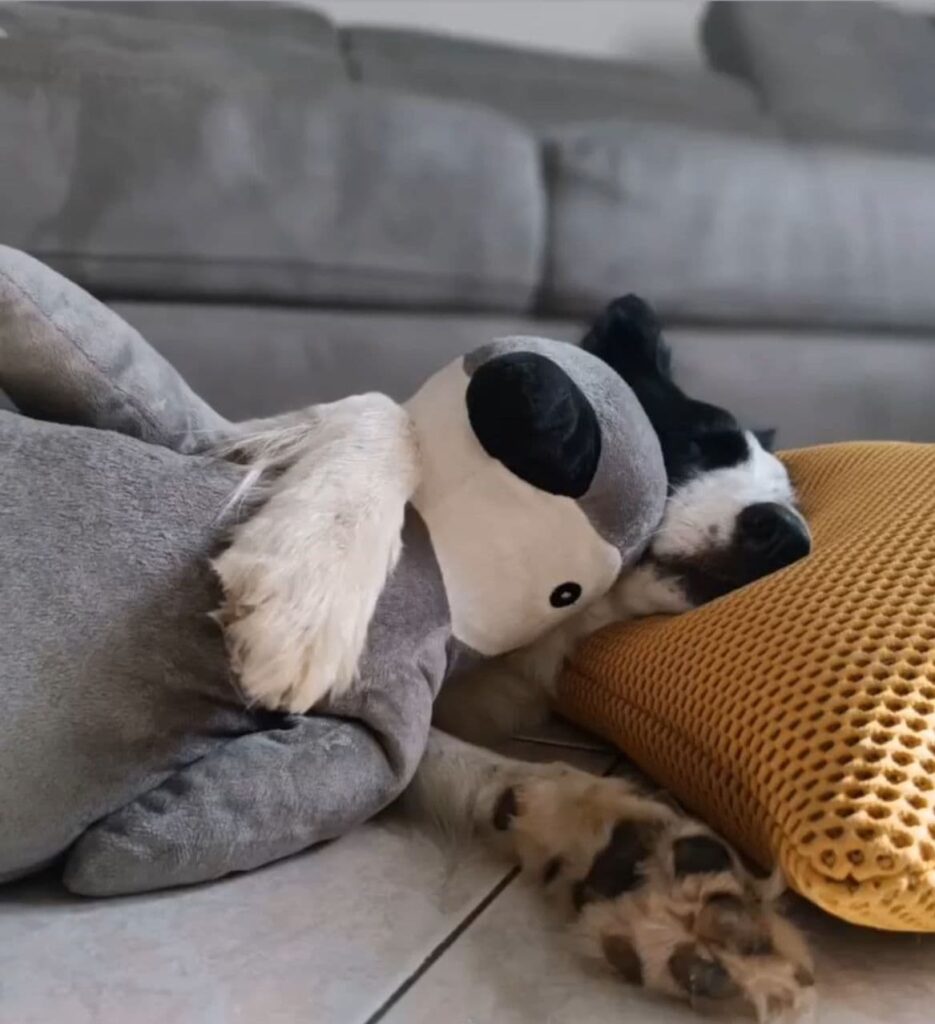
What’s next?
Dr. Fugazza told us that she wants to conduct further studies to explore whether dogs, even those who are not gifted word-learners, can think this way. Can they categorize objects by their function, even if they don’t know the words for those categories?
“As a scientist, right now, I cannot affirm that all dogs can categorize items that way,” Dr. Fugazza said.
“However,” she continued, “I wouldn’t be surprised to find that they actually do, even if they don’t learn the labels. That’s why I hope I can find a way to test it. As a dog owner, I would be happy to know that there is at least a very likely possibility that some level of abstract thinking is possible in dogs—more complex than we thought.”
Does this mean that dogs use language?
Last year, we spoke to Dr. Federico Rossano of the University of California, San Diego, who has studied dogs’ use of buttons on soundboards to communicate. He told us he hoped that future research would reveal whether dogs can understand syntax. “If you [a dog] have trained with ‘want,’” he told us at the time, “and then you start pushing ‘want outside,’ ‘want toy,’ ‘want water,’ without being trained for it—I’m sorry, but this is amazing. Because basically you have understood something about what ‘want’ means.”
Dr. Fugazza says that, as impressive as the dogs in her recent study were, what they did is not the same as grasping syntax. And, personally, she is not convinced that they can. “I would not say that these dogs have language,” Dr. Fugazza said of the gifted word-learners who could categorize items by function. Rather, she continued, “they have one particular little feature of language, which is learning verbal labels to relate or refer to items.”
What does this mean for your dog?
Most dogs won’t learn hundreds of words—gifted word-learners are rare, after all. But dogs are smart, and are always interacting with and thinking about the world around them.
“One thing that I would definitely say, and I would definitely do if I had a puppy myself now,” Dr. Fugazza said, “is talk more to my dog.” She said that, contrary to previous beliefs that dogs wouldn’t gain anything from people talking to them outside of specific cues, studies show that “they can pick up words that have some meaning, and in their brain they are connected to something.”
Plus, dogs like being included.
“They’re social animals,” she said. “Whatever you can do to include them in your life, I think it’s beneficial.”
Do you think your dog is a gifted word-learner?
If you notice that your dog is picking up a formidable vocabulary while you’re talking to them, you might be able to help with further research on gifted word-learners. If you think your dog is up to the task, and you’re interested, Dr. Fugazza and her colleagues would love to hear from you.
Main photo by Helge O. Svela.
